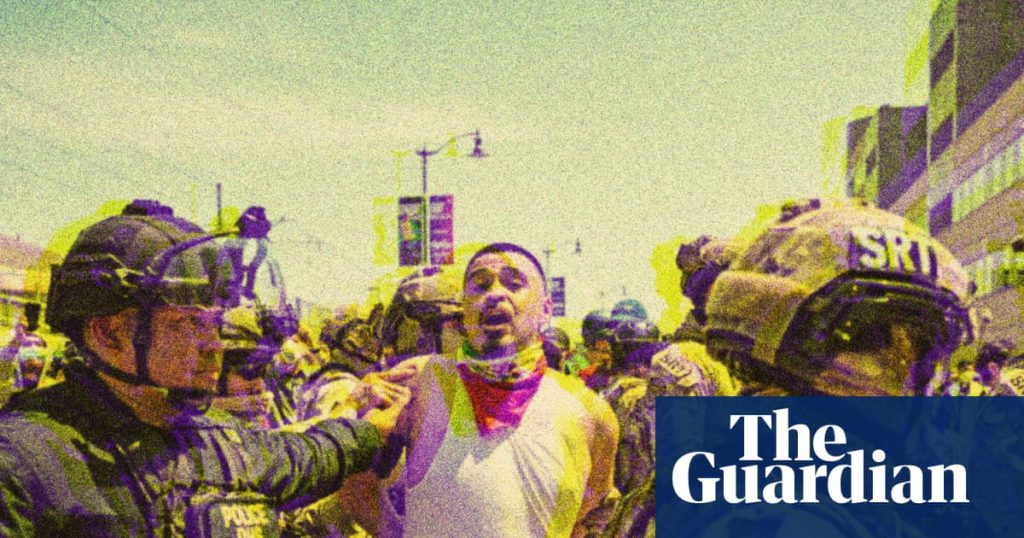Listen to the article
Federal Agents Made False Statements in Los Angeles Protest Arrest Reports, Documents Reveal
Federal immigration officers submitted false and misleading statements in official reports concerning several Los Angeles protesters arrested during demonstrations in June, according to confidential federal law enforcement documents obtained by the Guardian.
These inaccurate officer testimonies were cited in at least five cases filed by the U.S. Department of Justice during the unrest, which involved protests over immigration raids. The Justice Department has charged 26 people with “assaulting” and “impeding” federal officers and other crimes during these demonstrations. However, prosecutors have been forced to dismiss at least eight of those felony charges, many of which relied on officers’ inaccurate reports.
The rapid dismissals represent a significant embarrassment for Trump-appointed U.S. Attorney Bill Essayli and appear to stem from unusual procedural missteps by the Justice Department, according to former federal prosecutors familiar with such cases.
The investigation revealed several troubling patterns. Out of nine “assault” and “impeding” felony cases filed immediately after the protests began—and which were publicly promoted by Attorney General Pam Bondi—prosecutors dismissed seven shortly after filing charges. In at least five cases, Department of Homeland Security agents made demonstrably false statements about the sequence of events and misrepresented incidents captured on video.
In one particularly egregious case, a DHS agent accused a protester of shoving an officer, when video evidence showed the opposite—the officer forcefully pushed the protester. In another instance, an indictment named the wrong defendant entirely, a critical error that has jeopardized one of the government’s highest-profile cases.
“When I see felonies dismissed, that tells me either the federal officers have filed affidavits that are not truthful and that has been uncovered, or U.S. attorneys reviewing the cases realize the evidence does not support the charges,” said Cristine Soto DeBerry, a former California state prosecutor now directing Prosecutors Alliance Action, a criminal justice reform organization.
DeBerry noted that while officers often recommend charges that prosecutors ultimately decline to file, it is highly unusual for the Justice Department to file and then dismiss numerous felonies in rapid succession. “It seems this is a way to detain people, hold them in custody, instill fear and discourage people from exercising their first amendment rights,” she said.
The Justice Department still has 18 active cases against LA protesters, according to records shared with the Guardian. These include allegations ranging from throwing bottles and Molotov cocktails to pointing lasers at helicopters and distributing gas masks. Three defendants have accepted plea deals, including one accused of spitting at an officer and another allegedly caught throwing rocks.
In six of the dismissed felony cases, the Justice Department has refiled lower-level misdemeanors against the defendants. However, the impact on those initially charged with felonies has been substantial—all spent time in jail before the government’s cases collapsed.
“We are not the violent ones,” said Jose Mojica, one of the protesters whose assault case was dismissed. “They are chasing down innocent people.”
The first major wave of cases stemmed from a June 7 demonstration in Paramount, south of Los Angeles, where fears of immigration raids at a Home Depot prompted locals to gather outside a DHS office complex. During the confrontation, officers fired teargas and flash-bang grenades while some protesters allegedly threw objects.
The U.S. Attorney’s Office charged five Latino U.S. citizens with felony assault, threatening potential 20-year sentences. However, subsequent DHS reports revealed multiple factual discrepancies in the narrative initially presented. In one case, Border Patrol Agent Eduardo Mejorado, a key witness considered a victim of the alleged assaults, apparently gave inaccurate testimony about the chronology of events, later “clarifying” the timeline when questioned.
A DHS supervisor documented the correct sequence in a subsequent report and “apologized” for errors, attributing them to “the chaos of the events that day.” Video evidence presented by defense attorneys directly contradicted official accounts in multiple cases, showing officers initiating physical contact rather than protesters.
Within two weeks of filing the initial charges, the U.S. Attorney’s Office moved to dismiss cases against four of the five defendants “in the interest of justice,” without further explanation. Some cases were later refiled as misdemeanors with vague allegations and minimal detail.
U.S. Attorney Essayli, who initially published mugshots of the defendants, has not publicly acknowledged the dismissal of these felonies. When asked for comment, his spokesperson Ciaran McEvoy declined to address specific questions but stated: “Our office will continue working unapologetically to charge all those who assault our agents or impede our federal investigations.”
Attorney General Bondi defended Essayli in a statement, calling him a “champion for law and order” who has done “superlative work to prosecute rioters for attacking and obstructing law enforcement in Los Angeles.”
Legal experts view these cases as deeply problematic. “This is an extraordinary mistake and a dangerous embarrassment,” said Sergio Perez, former Justice Department lawyer and current executive director of the Center for Human Rights and Constitutional Law, referring to one case where prosecutors named the wrong defendant. “When you can’t get the name right, it calls into question all other factual assertions in those documents. It’s way beyond a clerical error. It’s smoke where there is likely fire.”
Former U.S. Attorney’s Office supervisor Carley Palmer noted that while prosecutors properly re-evaluating evidence shows “the process working,” it was unusual for the federal government to pursue “he said she said” protest scuffles that would typically be handled at the local level.
“Federal charges are very serious and have real implications for people’s lives,” Palmer added. “Even if it gets dismissed, it will be on someone’s record for the rest of their lives. It carries a lot of consequences, so you want prosecutors to understand and appreciate the power they have.”
Fact Checker
Verify the accuracy of this article using The Disinformation Commission analysis and real-time sources.



